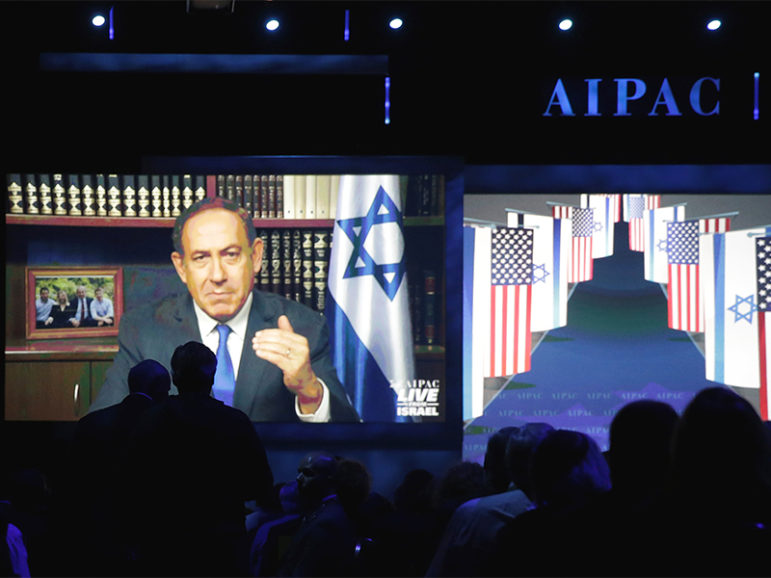This week at AIPAC, I invented a new drinking game.
Every time you hear the word “bipartisan,” you have to take a swig of beer.
Which would have resulted in 18,000 drunk Jews (and others).
Scary.
So, here’s the hidden bipartisan conversation: Israeli Judaism and American Judaism.
That was my takeaway from a private meeting between American Jewish religious leaders and members of the Knesset, held under the auspices of the Ruderman Family Foundation.
On one side of the table:
From the Reform movement: Rabbi Rick Jacobs, president of the URJ, and Rabbi David Saperstein, iconic social activist and now former U.S. ambassador at large for international religious freedom.
From the Conservative movement: Rabbi Steven Wernick, CEO of the United Synagogue. There was Allen Fagin, executive vice president of the Orthodox Union, and Rabbi Yossi Lipsker of Chabad of the North Shore in Boston.
From the Knesset: Mickey Levy of Yesh Atid; Ayelet Nachmias-Verbin, of Labor Zionist; Amir Ohana of Likud, the first openly gay right wing member of the Knesset, and Rachel Azaria and Tali Ploskov of Kulanu.
(Yes, there were more women Knesset members than women American Jewish religious leaders — which tells you something about American Judaism and/or how these invitation lists get constructed.)
The proverbial elephant in the room: Is there a growing divide between American Jews and Israel? And if so, why?
Fagin, representing mainstream Orthodoxy, had the answer. Very simple. The deeper your Jewish identity, the deeper your relationship with Israel. The more attenuated the identity, the more attenuated the relationship.
He could back that up with statistics from the most recent Pew report on Jewish identity. The degree of attachment of Orthodox Jews is significantly higher than other Jewish groups. More than 85 percent of Orthodox Jews have visited Israel — as a religious obligation. Sort of like, he mused, evangelical Christians, who feel the same way.
Imagine if intermarriage trends continue. The Pew report notes that 40 percent of the children of intermarriage have no emotional connection to Israel. What will the political landscape look like in another generation? Where will the support for Israel come from?
The non-Orthodox leaders had other questions, and other answers. American Jews are still emotionally connected to Israel. But if there is any bleeding, it is because of Israeli policy and attitudes towards non-Orthodox Judaism.
As Rabbi Jacobs said: the Israeli narrative is that Reform Judaism is the exit ramp from Judaism. But, it is actually the on ramp into deeper Jewish engagement.
And it affects Israel as well. Many Israelis come to work at Reform summer camps and, for the first time in their lives, they experience a vital Judaism for the first time. That Judaism is utterly different from state-imposed Orthodoxy and modernity-imposed secularism. In fact, the most redemptive thing that I have seen in Israel in recent years is the rise of a spiritually assertive non-Orthodoxy — Jews who are saying, “These texts and ideas belong to us as well!”
Rabbi Steven Wernick told the story of how his family traveled to Israel with his daughter, who was then seven years old. She had to go to the bathroom, and, rather than look for a public restroom, she believed that you could simply go to any person’s house, knock on the door, and use that person’s bathroom.
And why?
“Because this is Israel, and we are all family.”
Wernick continued: “So, why do I have to go to Israel and feel like a second class citizen because I’m a Conservative Jew? How did it come to be that the one place in the world where Jews are not free to be freely Jewish — is the Jewish state?”
To which MK Amir responded, almost wearily: “In Israel, I am not free to marry my partner -— the only place in the western world where that is true!”
OK, so there is general agreement (except, perhaps, from the Orthodox Jewish leaders, who remained relatively silent during this part of the conversation) — the political system in Israel, the incessant need to create coalitions with Orthodox parties, is responsible for this grievous situation.
Will that ever change? Will Israel come to understand that such behaviors and policies have only succeeded in alienating throngs of Diaspora Jews, whose support and emotional connection Israel so desperately needs?
Or (gulp) is Israel, perhaps even unwittingly, banking on a demographic reality that observers of American Judaism also (albeit reluctantly) admit?
Which is simply this: the most fervent American Jewish supporters of Israel are the Orthodox.
They are also the only sector of American Jewry that is numerically growing.
Memo to liberal, non-Orthodox Jews (as well as Jewish liberals): if fervent support for Israel becomes largely limited to a. Republicans and b. Orthodox Jews, then we will have massive challenges. Support for Israel will become an ideological ghetto.
That’s the sobering news.
The good news is that AIPAC demonstrated this year — more than ever before — that support for Israel cuts across party, ideological, generational (the huge crowds of high school and college students!), religious, class — and even racial lines.
Let me leave you with this fun fact that I picked up.
There are one hundred historically black colleges in the United States.
The student body presidents of half of them were at the AIPAC policy conference.
Way cool. And way hopeful.






